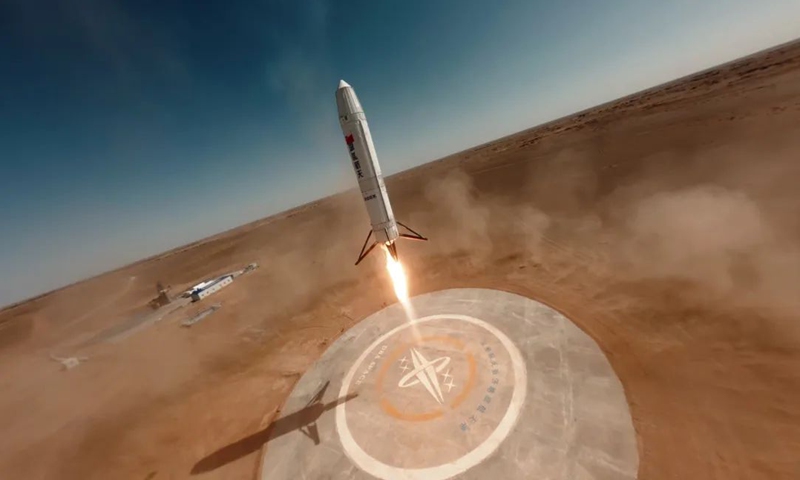
Photo: Deep Blue Aerospace
China's commercial aerospace start-up Deep Blue Aerospace conducted the first high-altitude vertical recovery flight test of its Nebula-1 rocket at a spaceport in Ejin Banner, North China's Inner Mongolia Autonomous Region at 1:40 pm on Sunday. This test was a significant milestone as it represented China's inaugural high-altitude recovery test for an orbital launch vehicle, although the mission was not completely successful after an anomaly occurred in the final landing phase.
According to the test outline, the Nebula-1 rocket successfully completed 10 out of 11 major verification tasks during the flight.
The rocket ignited three engines and ascended to the predetermined altitude, where two engines were shut down. It then relied on a single engine's thrust to stabilize its ascent and subsequently controlled its descent after reaching the peak altitude. The rocket successfully unlocked and deployed its landing legs at the designated height, but an anomaly occurred during the final landing phase, leading to partial damage to the rocket, according to a statement by the company on Sunday evening.
The entire flight lasted 179 seconds, with the rocket landing less than 0.5 meters from the theoretical landing point, precisely at the center of the recovery area. The test was conducted under strict safety management protocols, ensuring no safety incidents occurred throughout the process.
Following the test, preliminary data analysis indicated that during the final landing shutdown phase, there was an anomaly in the engine thrust control servo following the control commands. This led to the rocket landing at a height exceeding the design limits, resulting in some damage to the vehicle.
According to the company statement, plans are already in place for another high-altitude vertical recovery test in November, building on the lessons learned from this initial attempt.
The Nebula-1 rocket is Deep Blue Aerospace's first commercial liquid rocket capable of reaching orbit and being reused. It serves as a crucial platform for breaking through and validating vertical recovery and reusability technologies for rockets. The Nebula-1 has a body diameter of 3.35 meters and a first stage height of approximately 21 meters. It is equipped with the Thunder-R liquid oxygen and kerosene engine, a reusable liquid rocket engine developed entirely in-house by Deep Blue Aerospace, with over 90 percent of its main structure made using high-temperature alloy 3D printing technology.
The core objective of the test is to verify the correctness and coordination of various systems during the vertical recovery phase after the Nebula-1 reaches orbit, particularly for the first time validating the transition from multiple engines to a single engine under varying power conditions during flight. This can accumulate critical data for subsequent recovery flight tests at altitudes of around 100 kilometers, as well as for the final orbital and recovery test missions, said the company's statement.
According to the company, the test was conducted at the spaceport in Ejin Banner, which is the first fully commercialized facility in China capable of supporting liquid rocket launches and flight tests. The site is strategically located in a remote desert area, ensuring safety and minimizing risks during testing.
For this test, the Nebula-1 rocket was fueled with less than one-fifth of its total propellant capacity, successfully demonstrating precise attitude control under shallow propellant conditions during high-altitude recovery.
Also, this flight test is notable for being the first in China to employ an open-cycle liquid oxygen-kerosene engine for high-altitude recovery testing. The combination of liquid oxygen and kerosene offers high efficiency, low cost, and excellent safety and maintenance characteristics, making it an ideal choice for commercial reusable rockets.
The Thunder-R engine demonstrated effective thrust modulation throughout the flight, with a thrust adjustment range of 110 percent to 58 percent and a precision better than 1 percent, the company noted.
Global Times




